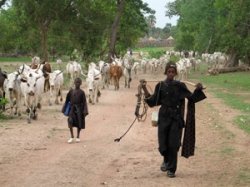Regional News of Thursday, 21 June 2012
Source: GNA
Committee recommends forcible eviction of Fulani herdsmen

The 11-member committee set up by Ashanti Regional Security Council (REGSEC) to work out an exit plan for Fulani herdsmen and their cattle in the Agogo area, had recommended the use of force to eject the herdsmen.
It said, that was the only option left following the refusal of the herdsmen to relocate with their animals.
Only two cattle owners had left with their herd as of the close of the April 30, 2012 deadline given to them and the rest have ignored the ultimatum with impunity.
This was contained in the Committee’s report presented by Mr. Alex Daary, Regional Director of the Bureau of National Investigations (BNI), to the Regional Minister, Dr. Kwaku Agyemang-Mensah, in Kumasi on Thursday.
It said since the Fulani issue in Agogo was not an isolated case, it was important that Government institutions, including the National Security Council, Interior Ministry and Parliament acted to find a lasting solution to it.
For some time now, there has been widespread resentment and agitations by the people of Agogo over alleged acts of atrocities, killings, rape, destruction of farms and water bodies by the herdsmen and their animals.
Even before the committee had come out with its report, a Kumasi High Court had ordered the REGSEC to take “immediate, decisive, efficacious and efficient action to flush out all cattle from Abrewapong, Mankala, Nyamebekyere, Kowereso, Adoniemu, Bebuso and Brehabebome.”
The committee established that there are indeed thousands of cattle in most communities in the area and that these animals do graze both during the daytime and night, causing destruction to farms. They drink from streams and rivers which also serve as critical water sources for the population.
It said the cattle owners have refused to provide the requisite confinements and water sources for their animals.
The committee said that activities of the herdsmen had adversely affected crop production and disrupted social life in the Agogo area.
It noted that farmers, teachers, school children, health workers and market women had not only been displaced but afraid to go about their normal business.
Chaired by Mr. Bempong Marfo, the committee was appointed on January 31, and was given two weeks to submit its report and recommendations but it took 13 weeks to complete the assigned job.
It asked for an extension of its mandate as it needed more time to conclude its investigations.
Dr. Agyemang-Mensah thanked the committee for the exhaustive work done and promised that the Security Council would act on its recommendations.
He said the Council would also consider the plea by the herdsmen for one more month grace to evacuate.**










